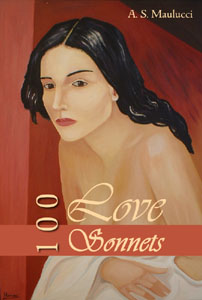Good Reading
 An anthology of Mexico sonnets by A. S. Maulucci
An anthology of Mexico sonnets by A. S. Maulucci
100 Love Sonnets
By A. S. Maulucci
Lorenzo Press, 2010
Available from Amazon Books: Paperback
“Well,” you might be asking, “just what does a book titled 100 Love Sonnets have to do with Mexico?”
“A lot,” I might answer, “because this is a collection 100 sonnets, the first 50 of which were written after the break-up of a fifteen-year marriage” and include fantasies of a future relationship. The final 50 were written after the author meets Gioia in San Miguel de Allende. They become lovers and “The second half of the sonnets, from 51 on, were inspired by and written for her.” Both halves, though, are about extraordinary women.
Author A. S. Maulucci recognizes that “the technical demands of the sonnet can be deadly,” and that contemporary taste tends to find tedious the “rigid rules of rhyme’ that the traditional sonnet adheres to.” Influenced more by Petrarch than by Shakespeare or Spenser, and even more by the contemporary poet Pablo Neruda — who also authored a collection called 100 Love Sonets — Maulucci chose a freer and fresher form, dispensing with rhyme although preserving the structure and even tone of the traditional sonnet. One hundred of them “seemed like enough to fully explore some of my ideas about human passion and the effect of romantic love on the mind of the male lover.”
One of the early sonnets bemoans the loss of his love although hope is still hiding there in his longing heart. Here are several lines that illustrate one of the preoccupations of this poet but also his skill:
I hope to kindle once again the fire
That burned so brightly in our eyes and lips
when first we beheld each other walking
in a garden of our own hearts’ making
and Time’s charioteer was sparing of his whips.(from #2)
But at other times that same fire seems to have burned him and he is wary, even warning the reader:
Beware! She is the kind that either kills
or heals the hearts of those who fall before
her soft looks, her gentle ways, her sweet sighs.(from #5)
Most of his memories of women are sensual ones, of her body… her lips, her breasts, her legs, her face… although there are memories of deeper qualities as well, “the jewels that cannot be looted.” There are lovely erotic lines throughout the book:
You ravished me when you raised your arms up
over your head and curved your back like a tree
bending in the breeze. The memory of this
brings me most fully alive even now.
(from #9)
As in all sonnet sequences, there is a story, or several stories, lurking below the surface of the sonnets; and likewise, the sonnets themselves provide the fifty-year-old poet the opportunity to reflect on his often troubled condition:
Am I sick with love or lust or some
lethal mixture of them both? Most likely.
I am a hopeless case but then my soul’sto blame for needing to indulge myself
with the rich and varied sweetness of life
in one so abundantly a woman.(from #15)
Some of the lines are profound:
Loving you still, I keep my youth alive.
(from #21)
And who cannot recognize themselves in lines like these:
Loving a woman for
the beauty of her face and form is a
dangerous and foolish way to love her….(from #22)
But by the time we reach Sonnet 50, when his new love Gioia enters his life, a new energy rushes forth:
How can I hold my passion within bounds
when I am overcome by your beauty?
Your face alone releases a torrent
of love that must come gushing forth or kill me.
The sonnets in this collection are filled with nicely turned conceits. Read these lines out loud (perhaps even to a loved one):
I know the sweet smell of apples on your skin.
You are a rich orchard unto yourself
and I a child set free to gathera robust harvest to last a lifetime.
Lock me in your arms and let me die here
having feasted on the fruits of your love.(from #79)
So, for all of you romantics, still captivated by the passions and mysteries and longings and confusions and joys of romantic love, this charming collection of sonnets penned in Mexico might be just the thing to curl up with on a cool autumn night.


